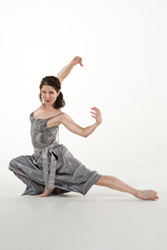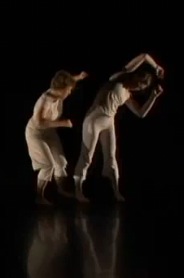October 16, 2009
BY HEDY WEISS, Theater Critic
Chicago Sun Times
 During a recent phone conversation with choreographer Julia Rhoads, her children — two girls, ages five and three, and a boy who is just one — were making happy noises in the background. In the foreground, however, were the probing thoughts of this Chicago-based artist whose company, the dance-theater troupe with the zany name of Lucky Plush Productions, is celebrating its 10th anniversary. Rhoads was talking about “Punk Yankees,” the evening-length work she has been devising over the course of a year, and which is set to have its world premiere next Thursday at the Dance Center of Columbia College.
During a recent phone conversation with choreographer Julia Rhoads, her children — two girls, ages five and three, and a boy who is just one — were making happy noises in the background. In the foreground, however, were the probing thoughts of this Chicago-based artist whose company, the dance-theater troupe with the zany name of Lucky Plush Productions, is celebrating its 10th anniversary. Rhoads was talking about “Punk Yankees,” the evening-length work she has been devising over the course of a year, and which is set to have its world premiere next Thursday at the Dance Center of Columbia College.
“This has been the craziest time,” Rhoads admits. “I feel like I’m in the middle of a storm, with the anniversary, and the whole trajectory of the company — and the babysitting arrangements.”
So, about the work. No, “Punk Yankees” is neither about about baseball, nor 1980s punk style, nor any combination of the two. It is about the whole phenomenon of artistic sampling, about authenticity and originality, about intellectual property and the notion of “ownership” in our digital age — particulary how all these things relate to dancemakers.
“The title came as I was doing research for the piece and found out about a book by Matt Mason called The Pirate’s Dilemma,” Rhoads explained. “Mason talked about how throughout history, piracy and appropriation have been linked to the creation of new markets, and have moved things forward. For example, Thomas Alva Edison invented one of the earliest phonographs — a machine that essentially ‘stole’ music that could be put on discs, and then sold without the musicians being there or getting paid. It transformed the whole art and business of music. Mason calls this ‘punk capitalism.’
“He also traced the word ‘Yankee’ to an old Dutch slang word ‘janke,’ meaning ‘pirate.’ And ironically enough, he was a keynote speaker at Dance/USA’s annual Conference in Texas this past June, in a session titled ‘Fair Use and Piracy: How They Each Support a Sustainable Dance Field.'”
So clearly the subject of artistic piracy is in the ether now. And Rhoads, who rarely revisits her own earlier works, began thinking that for her company’s 10th anniversary she might just take a retrospective look, and creatively sample (or “steal”) from herself, as well as from others, to make something new. “Punk Yankees” lifts moments from Lucky Plush history, from her own dancers’ histories and from dance work found on the Internet, and it breaks it up, recombines it, and puts it in a new context.
“There has been so much talk about the sampling of music in recent years, but very little about dance,” said Rhoads, who, early on in this project worked with Web technologists Noe Cuellar and Ian Hatcher to set up an elaborate interactive site. (Much fun is to be had at: www.StealThis Dance.com).
“I wanted to look at the notion of originality, and to try to discern the difference between a cut-and-paste job and the really serious challenge of taking many disparate pieces and trying to weave them into an arc, or set up a disruptive relationship. That’s a whole skill unto itself.”
“Punk Yankees,” performed by eight dancers, including Rhoads — with a mix of live webcams and pre-recorded video — will contain many references to pop culture, including a sophisticated mash of Beyonce’s super-hit, “Single Ladies” (which Rhoads says was inspired by a video of “Mexican Breakfast,” a dance sequence choreographed years ago by Bob Fosse and danced by Gwen Verdon, and never fully credited by Beyonce), as well as riffs on such iconic moments in recent pop dance history as the electric slide, the macarena and Michael Jackson’s moon walk. Sharp observers also will be able to pick out bits of dance sequences from such films as “West Side Story,” “Grease” and “A Chorus Line,” and images of “Swan Lake” in this work that features a complex original (and sampled) score by composer Stefen Robinson, with the Beyonce single as a template (and “fair use” rules vigorously adhered to).
“Dance is such an ephemeral art form — one that is passed from body to body in the studio,” said Rhoads. “Yes, now we have video. But that’s such a two-dimensional thing — so inorganic and frustrating for a three-dimensional art. Yet what is fascinating about all the video we have now is how it feeds the art of impersonation, which can be seen as just another form of identity theft. So there are good and bad sides of this technology. What I’ve learned is that it is important for dancers to see where they fit into the lineage, because we’re all a product of so many influences and ideas and visual cues. And so many other art forms are better documented than dance.”
Rhoads, who grew up in suburban Western Springs, and studied with the San Francisco Ballet in her teens, returned to the Chicago area to study history (with a side of dance) at Northwestern University. She was part of the XSIGHT! Performance Group for five years (“they showed me you could be a thinker and a mover”), and earned her MFA at the School of the Art Institute of Chicago.
Her future plans? “I’ll be collaborating with Leslie Buxbaum-Danzig of 500 Clowns to create a piece that loosely jumps off from an existing literary work.”
NOTE: Lucky Plush will present an hourlong Family Matinee at 3 p.m. on Oct. 24. And “Punk Yankees” will be the subject of two free panel discussions on Oct. 24 and 27 at the Dance Center, bringing together artists, lawyers and scholars. For details: www.colum.edu/dancecenter.
 Sunday, January 10, 2010
Sunday, January 10, 2010 During a recent phone conversation with choreographer Julia Rhoads, her children — two girls, ages five and three, and a boy who is just one — were making happy noises in the background. In the foreground, however, were the probing thoughts of this Chicago-based artist whose company, the dance-theater troupe with the zany name of Lucky Plush Productions, is celebrating its 10th anniversary. Rhoads was talking about “Punk Yankees,” the evening-length work she has been devising over the course of a year, and which is set to have its world premiere next Thursday at the Dance Center of Columbia College.
During a recent phone conversation with choreographer Julia Rhoads, her children — two girls, ages five and three, and a boy who is just one — were making happy noises in the background. In the foreground, however, were the probing thoughts of this Chicago-based artist whose company, the dance-theater troupe with the zany name of Lucky Plush Productions, is celebrating its 10th anniversary. Rhoads was talking about “Punk Yankees,” the evening-length work she has been devising over the course of a year, and which is set to have its world premiere next Thursday at the Dance Center of Columbia College.

